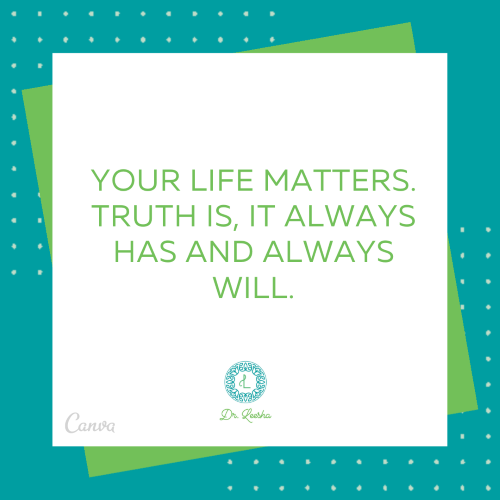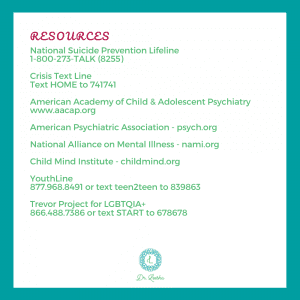Have you had thoughts of hurting yourself?
Have you felt like ending your life?
Almost daily I pose these two questions to every child, teen, and adult who comes into my office. Sometimes I get mostly nos; but, other times there are several yeses. Suicide is real. Suicide is common. Suicide is heartbreaking. Suicide is preventable.
National Suicide Prevention Month
September is National Suicide Prevention Month. It’s a hard topic to discuss but such a necessary one. I have lost patients to suicide. I have hospitalized patients for serious thoughts of suicide and for thwarted suicide attempts. I have witnessed the devastating legacy of suicide and attempted to help impacted families piece their lives back together in the aftermath.
Facts & Staggering Statistics from the Centers of Disease Control and Prevention
- Suicide is the 10th leading cause of death in the United States.
- Someone dies from suicide every 11 minutes.
- Over 48,000 people died by suicide in 2018.
- Suicide is the 2nd leading cause of death among individuals ages 10 – 34 years of age, the 4th leading cause of death for people ages 35 – 54, and the 8th leading cause of death for adults ages 55 – 64.
- Suicide is on the rise for Black youth – the suicide rate for black children ages 5 – 12 years is almost double that of white children within the same age group.
- Women are more likely to attempt suicide while men are more likely to die by suicide because they tend to use more lethal means (firearms).
Myths about Suicide
There are many mistruths about suicide, like suicide is selfish or that suicide is “the easy way out.” Some say suicide is cowardly, a lack of faith, that you are crazy, or it is evidence of moral failing. Suicide is none of these things. Let me say it again — suicide is NONE of these things.
Suicide is often the unbearable weight of depression. It’s an overwhelming desire to escape life’s pain, which is not necessarily a will to die. It’s hopelessness. It’s the illusion of finality, of no way out. It’s despair and anguish. It’s feeling like a burden to those who love you. For moms, it might feel like your children would be happier without you. For youth, it might be feeling alone, like you don’t belong, or growing tired of being bullied by peers.
As someone who sees people at their worst, let me assure you that your life matters. Unequivocally! Your life matters to me. It matters to those who love you — your family, your children, your friends, your significant other, your employers/colleagues, and so many others. Your life has purpose and meaning despite your present circumstances or the painful events that characterize your past. It can and will get better because treatment works. It’s not going to be easy nor quick, especially when suicidal thoughts come as a consequence of mental illness like depression, bipolar disorder, or Post Traumatic Stress Disorder, but treatment is effective. Therapy works. Medications helps.

Getting Help
- Reach out for help. You are not alone. You may feel alone, like no one cares; but you are not alone. Help is available. Reach out to a friend and let them know what’s going on. If that feels uncomfortable, then call your doctor, go to your local health department, or contact your local community mental health center, which provides low cost mental health services including therapy and medications. If you need immediate attention because you don’t feel safe, then call 911 or go to the nearest emergency room.
- For those who identify as Christian, Jesus + therapy + medications all work together beautifully. I am a believer, and I know that God has given me the gift of healing. He provides wise counsel through mental health providers. He gives unique insights to the researchers and those in the pharmaceutical industry to develop effective treatments. Your diagnosis does not mean that you lack sufficient faith or that God has turned his back on you.
- Stay connected. We are not meant to live life in isolation. Find healthy connections through church/religious gatherings, co-workers, friends, a significant other, online communities, neighbors, and more. Given the prevalence of suicide and mental disorders, it’s clear that many others are facing similar battles. Don’t go through life alone.
- Learn healthy coping skills to manage stress like journaling, breath work using apps like Breethe, adult coloring books, exercise, and mindfulness exercises. Stress is inevitable, but how you manage that stress dictates the severity of its impact on your life.
- Remove firearms and other weapons from your possession. Leave them with a friend or family member or get rid of them. Dispose of old medications. Formulate a safety plan that will include an ordered list of people to call and other steps to take if thoughts of suicide arise.
- If you are a friend or family member, take statements about suicide seriously. If you are worried about a loved one, then ask. Studies show that simply asking often brings relief and does not make someone decide to kill themselves.
Silence the Shame
It’s time to silence the shame and stigma. Mental illness is real. Stress, job loss, relationship drama, financial constraints, school difficulties, and COVID-19 and other health problems create emotional instability that can lead to depression, anxiety, and other mental disorders. There is nothing wrong with getting help. Getting help makes you a better parent, a better friend, a better spouse, a better you. While it takes courage to ask for help, your vulnerability and transparency will lead to your healing. You got this, my friend.
Your life really does matter. Yours is a life worth saving.












